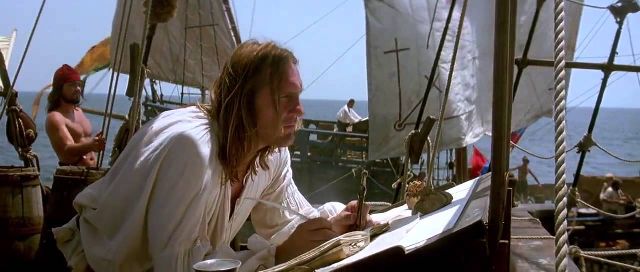1492: Conquest of Paradise (1992) 
“Centuries before the exploration of space, there was another voyage into the unknown.”

Director: Ridley Scott
Cast: Gérard Depardieu, Armand Assante, Sigourney Weaver
Synopsis: Christopher Columbus’ discovery of the Americas and the effect this has on the indigenous people.
It was inevitable that, as the 500th anniversary of the discovery of America approached there would be a flurry of interest in the story of Christopher Columbus, the Italian who (nearly) discovered the country that would one day grow to become the world’s last superpower. Thankfully (if one dismisses the UK ‘Carry On’ effort) only two movies made it to the big screen. Neither fared particularly well at the box office but, while John Glen’s Christopher Columbus: The Discovery arguably attracted more star names, it’s probably fair to say that Ridley Scott’s handsomely mounted version of Columbus’ expeditions to the New World is the better of the two. That said, Conquest of Paradise is a very uneven movie that entertains, informs, and bores in equal measure. There’s a great 105-minute story in this movie — unfortunately it’s been stretched to 145 minutes and, like big feet in good-looking shoes two sizes too small, it quickly makes you restless and uncomfortable.
The movie opens in 1492, the year Columbus made his first discoveries in the New World, with the explorer defending, in front of the church and the state, his contention that the world is round and that he could reach Asia in six to seven weeks if given the ships to do so. Columbus (Gerard Depardieu — Life of Pi) successfully canvasses Queen Isabella (Sigourney Weaver — Alien, Cabin in the Woods), and is soon about to set sail, leaving behind his young son and lover. It is only on the eve of the expedition that he confesses (literally) to a priest that the voyage will probably take much longer than he has claimed, thus subjecting his crew to a much longer absence from home than they have been led to expect.
1492: Conquest of Paradise is a beautiful film to look at, which is, perhaps, one of its faults. There are no filthy peasants in 15th Century Spain, no muddy streets, no pigs or dogs roaming free; everything looks beautiful and civilised and cultured, and you can’t help feeling throughout that you are watching a version of history as sanitised and romanticised as those Errol Flynn swashbucklers of the 1930s and 40s. The other major drawback is Gerard Depardieu in the role of Columbus; there is nothing particularly wrong with Depardieu — in fact, when it comes to conveying the emotional and spiritual upheavals Columbus undergoes, the hulking Frenchman does rather well — he is simply miscast (Director Ridley Scott apparently insisted that he would only direct if the role were given to Depardieu). First of all, we have to contend with the conundrum of a French man portraying an English-speaking Italian living in Spain; secondly, that accent. Depardieu possesses one of those sloppy English accents in which the words roll into one another in a slurred and often unintelligible melange which, in this film, really begins to grate when he assumes the role of narrator for a while once he and his crew land in the New World. And the demands made of Depardieu by the script sometimes make it difficult for him to deliver the kind of performance required of him — the supposedly ‘rousing’ speech he gives to his near-mutinous crew being an obvious case in point. It’s not Depardieu’s fault, but it still grates, nevertheless.
Writer Roselyne Bosch carried out extensive research before writing this film, so we have no reason to assume it is not historically accurate — although we might be forgiven for suspecting it glosses over some of Columbus’ less endearing failings — and it is perhaps that historical accuracy that sometimes bogs the movie down. It’s almost as if there is too much detail at times — which seems an absurd thing to write about an historical movie, but it’s true nevertheless — compare the plodding section during which Columbus strives to build his new city in San Salvador with the admirably compact — and tense — treatment given to Columbus’ initial voyage as the crew grow increasingly restless. And Columbus’ first sighting of the New World, while undoubtedly manipulated for dramatic impact, is equally impressive.
Once in the New World, things begin to fall apart for Columbus — and pick up for the viewer — as tension between Columbus and the nobles on the journey, and between the Spanish and the natives, builds to boiling point. A villainous nobleman — Michael Wincott, physically resembling some dissolute 70s rock star and sounding not unlike the old don from Prizzi’s Honor — triggers a violent half-hour that adds an all too brief shot in the arm to the movie before it lapses once again and, even worse, dips into the Big Hollywood Book of Philosophical Platitudes (“Paradise and Hell can be earthly,” intones Columbus at one point, “We carry them both wherever we go.”).
1492: Conquest of Paradise is an intelligent, if flawed, movie that will please nobody who is unfamiliar with the story within (and that’s not as daft a statement as you might think, believe me). Those with an interest in Columbus will find it by turns fascinating and infuriating, but will not regret having viewed it; those who can appreciate technical excellence and superb cinematography will also be rewarded. But those expecting some kind of throwback to Flynn’s swashbuckling heyday of flashing blades and heaving bosoms will be sorely disappointed.
(Reviewed 23rd September 2005)
httpv://www.youtube.com/watch?v=bmnLrzG2zKw
